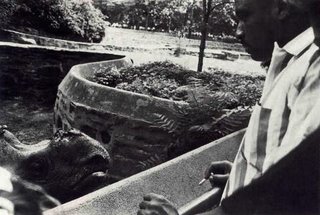 Just picked up my reserved copy of John Berger-selected essays from the library and can't seem to put it down. I read a smattering of his stuff in art school (where his essays on perception are offered up to first years like a final sip of wine before the water and bread diet of critical theory begins) but hardly anything since and I'm not sure why. Art School soured me on a lot of the things it was trying to teach me to love.
Just picked up my reserved copy of John Berger-selected essays from the library and can't seem to put it down. I read a smattering of his stuff in art school (where his essays on perception are offered up to first years like a final sip of wine before the water and bread diet of critical theory begins) but hardly anything since and I'm not sure why. Art School soured me on a lot of the things it was trying to teach me to love.There is a quiet, clear-eyed compassion that sits just below the skin of Berger's graceful sentences like a beating heart:
"The family visit to the zoo is often a more sentimental occasion than a visit to a fair or a football match. Adults take children to the zoo to show them the originals of their 'reproductions' [the toys, cartoons, pictures, decorations of animals that surround most children from an early age], and also perhaps in the hope of re-finding some of the innocence of that reproduced animal world which they remember from their own childhood.
The animals seldom live up to the adults' memories, whilst to the children they appear, for the most part, unexpectedly lethargic and dull. (As frequent as the calls of animals in a zoo are the cries of children demanding: Where is he? Why doesn't he move? Is he dead?) And so one might summarise the felt, but not necessarily expressed, question of most visitors as: Why are these animals less than I believed?
And this unprofessional, unexpressed question is the one worth answering."
<< Home